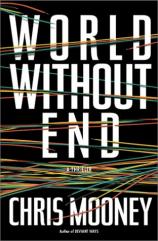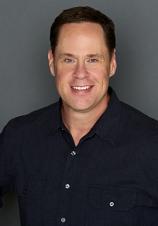Interview: January 11, 2002
January 11, 2002
Author Chris Mooney's second thriller, WORLD WITHOUT END, tells the fast-paced and timely tale of terrorists, germ warfare and international intrigue. Join Bookreporter writer Chuck Leddy as he discusses these issues and more with the author.
TBR: The book is filled with cutting edge, futuristic technology. What role does all this technology play in the novel, and how did you learn about it all?
CM: I saw a program on the Discovery Channel about non-lethal combat weapons where they did a segment on optical camouflage. The idea of having this futuristic combat suit that can turn you invisible was just too good to pass up. I did some research and found out that the technology does, in fact, exist. Not quite in the way I describe it in the novel, but that day isn't too far away.
TBR: The book has a strong sense of place. Why did you decide to locate the action in Austin and Boston, and how did you research all the geographic details?
CM: I was with my wife, driving out of Austin when we hit this long highway that had nothing but dirt and burnt grass on either side. I'm talking fields of it, you're out in the middle of nowhere. We drove for several miles and I saw maybe two mobile homes and then this old, weathered billboard for a skydiving school. As for Boston, I live in downtown Boston so researching Beacon Hill and the surrounding areas I described in the book was easy. DEVIANT WAYS, my first novel, took place in Marblehead and parts of Boston.
TBR: The moral atmosphere of the novel is certainly ambiguous. What does Conway learn about himself as the plot progresses?
CM: You're right, the moral atmosphere is ambiguous. I don't like wrapping things up nice and neat because life doesn't work that way. Conway is very young when he joins this group and almost gets himself killed the first time around. Then he decides to get back in the game because this is who he is, this is how he defines himself. I would say that Conway is somewhat obsessed about wanting to do the right thing. What I think he realizes toward the end of the novel is that being good and doing the right thing often carries a high price.
TBR: Some readers might think the "message" of the book is that authority cannot be trusted, indeed that almost nobody can be trusted. Would you agree with such a reading?
CM: I agree with it, since that's how I presented it in the novel. I don't think authority as a whole can be trusted. The larger the organization, the more you're at risk. Conway's an orphan so that's had a significant impact on how he views himself. He has a very limited group of close friends and doesn't like to get close to people. I would even say that he's cold. He's certainly a loner. But when he does reach out and trust, he gets hurt. You can have close friendships, you may be a part of a group you respect, you can love someone and think you know them inside and out but the reality is that you may not. People can have so many different layers and present to you only what they want you to see. I wanted to explore that in the book.
TBR: You work hard to humanize all your characters, even the ostensible "bad guys" such as Bouchard. Their backgrounds are meticulously explored. Why?
CM: It makes characters interesting, especially the bad guys since readers want to understand their choices and what motivates them. People aren't one-dimensional, and neither are good characters. Take Hannibal Lector. One of the reasons he's so popular is that he's presented as a human being. He breathes, he eats and sleeps just like the rest of us --- he has a capacity for compassion, even love --- but underneath it all, he's got a massive, dark intellect and a range of terrifying desires. There's so many layers there, so much to explore. I love reading stories about complicated characters. Dennis Lehane's MYSTIC RIVER was one of the best books I read last year, and what made it so interesting to me was how he humanizes the character such as Jimmy Marcus, who has a very violent past. People, both good and bad, are complex, and complex characters makes for a more interesting story.
TBR: Is Conway a "hero" in the conventional sense of the word?
CM: To me, a hero is a father who gets up every morning and goes to a job he hates so he can put food on the table for his family. That's my definition of a hero. By "conventional sense of a hero," since Conway goes out and fights the bad guys and risks his life, yes, by definition he's a hero. But he doesn't get out of these situations without some permanent scars. His actions end up costing him. When you reach the end of the book, I want readers to look at Conway and ask, "Was it worth it?"
TBR: The scene at the New England Aquarium is amazing. How did you come up with the idea of having Conway and Misha in the shark tank?
CM: I was at the Aquarium and remember seeing the sharks swimming around and that writer's voice in my head whispered, "What would happen if you were trapped in there and bleeding with all those sharks swimming around?" It was sort of an over-the-top scene and I didn't like it at first, but my agent and editor talked me into it. I'm glad, since that's the scene that readers keep asking me about.
TBR: What are your thoughts on the character of Angel Eyes?
CM: He's by far the most complicated character in the book --- and was the most fun to write. It's hard to talk about him without giving anything away. I can tell you that he's a burn victim and he's afraid of germs, he's also very charismatic. He's not what you think. He's going to have you guessing until the very end of the book, much like in the same way I had Malcolm Fletcher in DEVIANT WAYS. People who were drawn to Fletcher are going to be drawn to Angel Eyes. Who knows, maybe the two of them will end up meeting someday.
TBR: What was your writing process like for WORLD WITHOUT END?
CM: It was tough. I knew in the beginning that the plot would be complicated. I wrote two hundred pages over five months and then scrapped them and started over. What made it all work was the ending. I already knew how the book was going to end and built the book around that. But it was a huge risk. If the reader didn't buy it, then the whole book would have collapsed. The best feeling was having my editor call me and say, "I loved the ending. You had me completely fooled!" Huge relief. Major relief. I don't think I'll tackle a book like that again.
TBR: What's next for you?
CM: I don't tend to talk about what I'm currently working on, mainly because I never know how the book's going to turn out until I'm done --- and it always turns out different from I first expect. What I can tell you is that the next book is called REMEMBERING SARAH, and that it's a thriller that takes place in Boston. There's also talk of a possible movie deal for WORLD WITHOUT END, which is pretty exciting.




